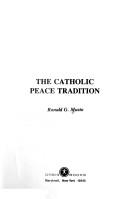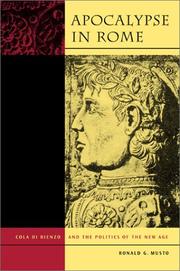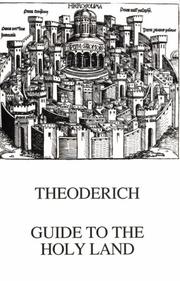| Listing 1 - 10 of 12 | << page >> |
Sort by
|
Book
ISBN: 0824036247 Year: 1991 Volume: vol 507 Publisher: New York London Garland
Abstract | Keywords | Export | Availability | Bookmark
 Loading...
Loading...Choose an application
- Reference Manager
- EndNote
- RefWorks (Direct export to RefWorks)
241.1*31 --- Feminist theology --- -Liberation theology --- Theology of liberation --- Theology, Doctrinal --- Kairos documents --- Philosophy of liberation --- Theology, Feminist --- Politieke theologie. Bevrijdingstheologie. Ethiek van de revolutie --- Bibliography --- Bibliography. --- 241.1*31 Politieke theologie. Bevrijdingstheologie. Ethiek van de revolutie --- Liberation theology --- Liberation theology - Bibliography. --- Feminist theology - Bibliography.

ISBN: 0883442639 9780883442630 Year: 1986 Publisher: Maryknoll (N.Y.): Orbis,
Abstract | Keywords | Export | Availability | Bookmark
 Loading...
Loading...Choose an application
- Reference Manager
- EndNote
- RefWorks (Direct export to RefWorks)
Peace --- Religious aspects --- Catholic Church --- History of doctrines --- Doctrines --- History --- 241.65*4 --- -261.7 --- 811 Filosofie --- 811.1 Rechtvaardige oorlog --- 815 Geschiedenis --- 825 Ontwikkelingssamenwerking --- 845 Religie --- 855 Oorlogsvoering --- 861 Vredesbeweging --- 882.4 Noord-Amerika --- 884 Europa --- Coexistence, Peaceful --- Peaceful coexistence --- International relations --- Disarmament --- Peace-building --- Security, International --- War --- Theologische ethiek: oorlog; vrede; atoomwapens; pacifisme --- -Catholic Church --- -History --- -Sources --- De Kerk en de burgerlijke macht: Kerk en Staat; godsdienstvrijheid; verdraagzaamheid; tolerantie:--theologische aspecten --- -Church of Rome --- Roman Catholic Church --- Katholische Kirche --- Katolyt︠s︡ʹka t︠s︡erkva --- Römisch-Katholische Kirche --- Römische Kirche --- Ecclesia Catholica --- Eglise catholique --- Eglise catholique-romaine --- Katolicheskai︠a︡ t︠s︡erkovʹ --- Chiesa cattolica --- Iglesia Católica --- Kościół Katolicki --- Katolicki Kościół --- Kościół Rzymskokatolicki --- Nihon Katorikku Kyōkai --- Katholikē Ekklēsia --- Gereja Katolik --- Kenesiyah ha-Ḳatolit --- Kanisa Katoliki --- כנסיה הקתולית --- כנסייה הקתולית --- 가톨릭교 --- 천주교 --- -Doctrines --- 261.7 De Kerk en de burgerlijke macht: Kerk en Staat; godsdienstvrijheid; verdraagzaamheid; tolerantie:--theologische aspecten --- 241.65*4 Theologische ethiek: oorlog; vrede; atoomwapens; pacifisme --- 261.7 --- Religious aspects&delete& --- Catholic Church&delete& --- History. --- Church of Rome --- Peace - Religious aspects - Catholic Church - History of doctrines

ISBN: 1283277069 9786613277060 0520928725 1597344710 9780520928725 1417522763 9781417522767 0520233964 9780520233966 Year: 2003 Publisher: Berkeley University of California Press
Abstract | Keywords | Export | Availability | Bookmark
 Loading...
Loading...Choose an application
- Reference Manager
- EndNote
- RefWorks (Direct export to RefWorks)
On May 20, 1347, Cola di Rienzo overthrew without violence the turbulent rule of Rome's barons and the absentee popes. A young visionary and the best political speaker of his time, Cola promised Rome a return to its former greatness. Ronald G. Musto's vivid biography of this charismatic leader-whose exploits have enlivened the work of poets, composers, and dramatists, as well as historians-peels away centuries of interpretation to reveal the realities of fourteenth-century Italy and to offer a comprehensive account of Cola's rise and fall. A man of modest origins, Cola gained a reputation as a talented professional with an unparalleled knowledge of Rome's classical remains. After earning the respect and friendship of Petrarch and the sponsorship of Pope Clement VI, Cola won the affections and loyalties of all classes of Romans. His buono stato established the reputation of Rome as the heralded New Jerusalem of the Apocalypse and quickly made the city a potent diplomatic and religious center that challenged the authority-and power-of both pope and emperor. At the height of Cola's rule, a conspiracy of pope and barons forced him to flee the city and live for years as a fugitive until he was betrayed and taken to Avignon to stand trial as a heretic. Musto relates the dramatic story of Cola's subsequent exoneration and return to central Italy as an agent of the new pope. But only weeks after he reestablished his government, he was slain by the Romans atop the Capitoline hill. In his exploration, Musto examines every known document pertaining to Cola's life, including papal, private, and diplomatic correspondence rarely used by earlier historians. With his intimate knowledge of historical Rome-its streets and ruins, its churches and palaces, from the busy Tiber riverfront to the lost splendor of the Capitoline-he brings a cinematic flair to this fascinating historical narrative.
Revolutionaries --- Revolutionists --- Dissenters --- Counterrevolutionaries --- Rienzo, Cola di, --- Cola di Rienzi, --- Di Rient︠s︡o, Kola, --- Di Rienzi, Cola, --- Di Rienzo, Cola, --- Gabrino di Rienzo, Niccolò, --- Kola di Rient︠s︡o, --- Rient︠s︡o, Kola di, --- Rienzi, Cola di, --- Rome (Italy) --- Rome (Italy : Commune) --- Rome (Italy : Governatorato) --- Rūmah (Italy) --- Roma (Italy) --- Rom (Italy) --- Rím (Italy) --- Rzym (Italy) --- Comune di Roma (Italy) --- Rome --- History --- Rome (Italy : Comune) --- assassination. --- barons. --- biography. --- buono stato. --- capitoline. --- catholic church. --- central italy. --- christianity. --- cola di rienzo. --- correspondence. --- coup. --- cultural history. --- diplomacy. --- documentary history. --- emperor. --- fall of rome. --- fugitive. --- government. --- italian history. --- italy. --- medieval. --- nonfiction. --- orator. --- papacy. --- petrarch. --- political exile. --- political history. --- political prisoner. --- politicians. --- politics. --- pope clement vi. --- pope. --- rebellion. --- religion. --- resistance. --- revolution. --- roman empire. --- roman history. --- roman leaders. --- romans. --- rome. --- tiber.
Book
ISBN: 9781108471923 1108471927 9781108559355 9781108458597 1108685064 1108559352 1316999378 Year: 2021 Publisher: Cambridge Cambridge University Press
Abstract | Keywords | Export | Availability | Bookmark
 Loading...
Loading...Choose an application
- Reference Manager
- EndNote
- RefWorks (Direct export to RefWorks)
This book started with a hypothesis that I first published online in 2015: that the "Dissolution of the Monasteries" under Henry VIII in England in the 1530s provides a working metaphor for current challenges to higher education in the United States, and by extension to other Anglophone systems. Why has this book adopted such a historical metaphor? Centuries, political systems and economies, social systems, and universes of belief divide our world from that of late medieval and early modern England and Europe. Skeptics will be quick to point out that - unlike the medieval monastery - the modern American university is secular, devoted to the pursuit of reason and knowledge, open to all, and forged around the values of this, not the next, world. They will add that, unlike the medieval monastery that emerged from a hatred of the world and civil society and was the tap root of all "medieval" obscurantism, the modern university was born of Renaissance and Enlightenment. It freed minds and bodies from the bonds of authority and blind tradition. It unchained and opened books and knowledge for all. Excellence and the free exchange of ideas were and are its inspirations and guiding principles. How can any valid comparisons - positive or negative - be made between the two institutions? This book seeks to answer these objections by demonstrating the clear affinities between the institutional life cycles of the monastery and the university.
378.4 <73> --- 378.18 <73> --- 378.18 <73> Studenten: statuut. Maatschappelijke problemen van studenten--Verenigde Staten van Amerika. VSA. USA --- Studenten: statuut. Maatschappelijke problemen van studenten--Verenigde Staten van Amerika. VSA. USA --- 378.4 <73> Universiteiten--Verenigde Staten van Amerika. VSA. USA --- Universiteiten--Verenigde Staten van Amerika. VSA. USA --- EDUCATION / History. --- Education, Higher --- Universities and colleges --- Aims and objectives --- Effect of technological innovations on. --- Political aspects --- Administration
Book
ISBN: 1108559352 1108685064 1316999378 Year: 2021 Publisher: Cambridge : Cambridge University Press,
Abstract | Keywords | Export | Availability | Bookmark
 Loading...
Loading...Choose an application
- Reference Manager
- EndNote
- RefWorks (Direct export to RefWorks)
American higher education is under attack today as never before. A growing right-wing narrative portrays academia as corrupt, irrelevant, costly, and dangerous to both students and the nation. Budget cuts, attacks on liberal arts and humanities disciplines, faculty layoffs and retrenchments, technology displacements, corporatization, and campus closings have accelerated over the past decade. In this timely volume, Ronald Musto draws on historical precedent - Henry VIII's dissolution of British monasteries in the 1530s - for his study of the current threats to American higher education. He shows how a triad of forces - authority, separateness, and innovation - enabled monasteries to succeed, and then suddenly and unexpectedly to fail. Musto applies this analogy to contemporary academia. Despite higher education's vital centrality to American culture and economy, a powerful, anti-liberal narrative is severely damaging its reputation among parents, voters, and politicians. Musto offers a comprehensive account of this narrative from the mid-twentieth century to the present, as well as a new set of arguments to counter criticisms and rebuild the image of higher education.
Book
ISBN: 0815306059 Year: 1996 Publisher: New York (N.Y.): Garland
Abstract | Keywords | Export | Availability | Bookmark
 Loading...
Loading...Choose an application
- Reference Manager
- EndNote
- RefWorks (Direct export to RefWorks)
Book
Year: 1983
Abstract | Keywords | Export | Availability | Bookmark
 Loading...
Loading...Choose an application
- Reference Manager
- EndNote
- RefWorks (Direct export to RefWorks)
Book
ISBN: 0815306040 Year: 1993 Publisher: New York (N.Y.): Garland
Abstract | Keywords | Export | Availability | Bookmark
 Loading...
Loading...Choose an application
- Reference Manager
- EndNote
- RefWorks (Direct export to RefWorks)
Peace --- -Religious aspects --- -Catholic Church --- Catholic Church --- Doctrines.
Multi
ISBN: 9781107013193 9781107601024 1107601029 1107013194 9781139003865 1316308383 1139003860 1316287572 Year: 2015 Publisher: Cambridge: Cambridge university press,
Abstract | Keywords | Export | Availability | Bookmark
 Loading...
Loading...Choose an application
- Reference Manager
- EndNote
- RefWorks (Direct export to RefWorks)
"The Digital Humanities is a comprehensive introduction and practical guide to how humanists use the digital to conduct research, organize materials, analyze, and publish findings. It summarizes the turn toward the digital that is reinventing every aspect of the humanities among scholars, libraries, publishers, administrators, and the public. Beginning with some definitions and a brief historical survey of the humanities, the book examines how humanists work, what they study, and how humanists and their research have been impacted by the digital and how, in turn, they shape it. It surveys digital humanities tools and their functions, the digital humanists' environments, and the outcomes and reception of their work. The book pays particular attention to both theoretical underpinnings and practical considerations for embarking on digital humanities projects. It places the digital humanities firmly within the historical traditions of the humanities and in the contexts of current academic and scholarly life"--
681.3*15 --- Computerwetenschap--?*15 --- Digital humanities --- Humanities --- Humanists --- Digital media --- Digital communications --- Information storage and retrieval systems --- Sciences humaines --- --Recherche --- --Méthodologie --- --Enseignement --- --Vie intellectuelle --- --Média digitaux --- --Communication digitale --- --Système de recherche --- --Système de stockage --- --Research --- Methodology --- Study and teaching --- Intellectual life --- Digital media. --- Digital communications. --- Data processing. --- Research. --- Methodology. --- Study and teaching. --- Intellectual life. --- Humanities. --- Communications, Digital --- Digital transmission --- Pulse communication --- Digital electronics --- Pulse techniques (Electronics) --- Telecommunication --- Signal processing --- Electronic media --- New media (Digital media) --- Mass media --- Online journalism --- Scholars --- Learning and scholarship --- Classical education --- Digital techniques --- Data processing --- Information technology --- Science --- Methods in social research (general) --- Humanities Methodology --- Humanities - Research --- Humanities - Methodology --- Humanities - Study and teaching --- Humanists - Intellectual life --- Information storage and retrieval systems - Humanities --- Recherche --- Méthodologie --- Enseignement --- Vie intellectuelle --- Média digitaux --- Communication digitale --- Système de recherche --- Système de stockage --- Humanities research --- Digital humanities.

ISBN: 0934977038 Year: 1986 Publisher: New York (N.Y.) Italica
Abstract | Keywords | Export | Availability | Bookmark
 Loading...
Loading...Choose an application
- Reference Manager
- EndNote
- RefWorks (Direct export to RefWorks)
Christian pilgrims and pilgrimages --- Theodericus, --- Travel --- Palestine --- Description and travel.
| Listing 1 - 10 of 12 | << page >> |
Sort by
|

 Search
Search Feedback
Feedback About UniCat
About UniCat  Help
Help News
News